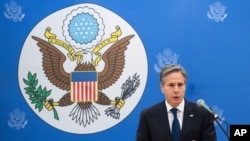U.S. Secretary of State Antony Blinken and Russian Foreign Minister Sergey Lavrov are set to meet Wednesday on the sidelines of the Arctic Council ministerial in Reykjavik, Iceland.
It will be the first face-to-face meeting for the top U.S. and Russian diplomats and comes at a time of heightened tension between their countries. The meeting will also set the stage for a planned summit next month between U.S. President Joe Biden and Russian leader Vladimir Putin.
The U.S. State Department said Wednesday afternoon’s session “will provide an opportunity to test the proposition of whether we can achieve a relationship with Moscow that is more stable and predictable.”
Blinken on Tuesday urged the global community to avoid militarizing the Arctic. The United States has previously accused Russia of requiring foreign ships to seek permission to pass through the region and to allow Russian maritime pilots to board the vessels while threatening violence against noncompliant ships.
“We've seen Russia advance unlawful maritime claims, particularly its regulation of foreign vessels transiting the Northern Sea route, which are inconsistent with international law,” Blinken said at a joint media briefing with Iceland’s foreign minister.
Blinken’s remarks came a day after Lavrov warned Western countries not to claim rights to the Arctic.
“It has been absolutely clear for everyone for a long time that this is our territory, this is our land,” Lavrov told reporters in Moscow. “We are responsible for ensuring our Arctic coast is safe.”
As climate change accelerates the melting of the Arctic’s ice sheet, the Arctic becomes more accessible.
In recent years, Putin has made Russia’s Arctic region a higher strategic priority, raising tensions with Arctic Council members over its investments in military infrastructure and mineral extraction.
The United States has recently been at odds with Russia over Moscow’s jailing of Kremlin critic Alexey Navalny, Russia’s buildup of military forces near Ukraine, and a cyberattack on the largest U.S. gas pipeline by hackers believed to be in Russia.
Russia says its government was not involved in the cyberattack. It has accused the United States of trying to interfere in its domestic issues, including the jailing of Navalny.





